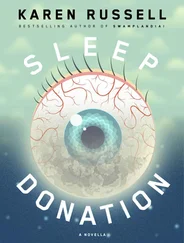Still, where else are they supposed to go? Beverly is a professional. She is not going to confuse everything even further at this late hour by beginning to see patients in her home.
Beverly has keys to the building. She drives beneath a full, icy moon, following the chowdery line of the Esau River. All the highways are empty. When she pulls into her staff slot, the sergeant’s blue jalopy is already there.
“Thank you,” he mumbles as they climb out of their cars. His eyes are red hollows. “Don’t be scared, promise? I don’t know what went wrong the other day.”
Beverly, who has some idea, says nothing.
“Are you afraid of me, Beverly?”
“Afraid! Why would I be? Are you angry at me?”
Kind nos are exchanged.
There is a fat moon behind him, one white ear eavesdropping brazenly in the midwestern sky.
Beverly fumbles with the car lock, gets them both inside the building. Something is moving under his shirt, on his back, she can see it, a dark shape. In the onlyness of moonlight, his snowy boots look almost silver. Nothing stirs in the long hallway; when they pass the crescent of the reception desk, she half expects Ed to leap up in a fountain of expletives. Their shoes mewl on the tiles, sucked along by slush. They speak at the same time—
“Lie down?”
“I’ll go lie down—”
“Thank you for meeting me, Beverly,” he says again, sounding so much like a boy about to cry. “Something’s wrong, something’s wrong, something’s wrong, something’s wrong .” He groans. “Ah, Bev! Something feels twisted around …”
He pulls off his shirt, lies down. Beverly sucks in her breath — his back is in terrible shape. The skin over his spine looks raw and abraded; deep blue and yellowish bruises darken the sky of Fedaliyah. And a long, bright welt, much thicker and nastier than the thin scar she erased, stretches diagonally from his hip bone to his shoulder.
“Jesus, Derek! Did someone do this to you? Did you do this to yourself?”
“No.”
“Did you have some kind of accident?”
“I don’t know,” he says flatly. “I don’t remember. It looked this way when I woke up two days ago. It’s gotten worse.”
Beverly touches his shoulder and they both wince. Maybe the welt did erupt from inside the tattoo. Maybe Derek vandalized the tattoo himself, and he’s too ashamed or too frightened to tell her. She’s surprised to discover how little the explanation matters to her. In the end, every possibility she can imagine arises from the same place — a spark drifting out of his past and catching, turning into this somatic conflagration. No matter how it happened, she is terrified for him.
She dips a Q-tip into a bottle of peroxide, stirs.
This time she abandons any pretension of getting the true story out of him. She doesn’t try to grab hold of April 14 and reset it like a broken bone. She doesn’t mention IEDs or Mackey. Her concerns about whether or not it would be better for the sergeant to forget the wire, wipe his slate clean, are gone; she thinks those debates must belong to a room without this boy hurting in it. All she wants to do right now is reduce his pain. If she can help him with that, she thinks, it will be miracle enough.
“Don’t worry,” she says. “We’re going to fix you up. Hold still for me, Derek.”
She begins at the base of his spine, rolling up, avoiding the most irritated areas. He whimpers only once. Through his neck, she can feel the strain of his gritted teeth.
“That fucking kills , Beverly — what are you doing?”
“Shh — you focus on relaxing. This is helping.”
She defaults to what she knows. Eventually, as in the first sessions, she can feel something shifting under her hands. Her voice needles in and out of Zeiger’s ears as she tells him where to move and bend and breathe. It’s dark in the room, and she’s barely looking at his back, letting his fascia and muscles guide her fingers. Gradually, and then with the speed of windblown sands, the story of the tattoo begins to change.

A little after five a.m., Beverly stops the massage to button her sweater up to her neck. It’s the same baggy cerulean skin that she always puts on, her old-lady costume. Tonight her sleeves bunch at her elbows, so that she feels like a strange molting bird — eating keeps slipping her mind. The moon is out; their two cars, viewed through the clinic window, have acquired a sort of doomed mastodon glamour, shaggy with snow. A green light blinks ceaselessly above her, some after-hours alarm she’s never here to see. She checks to make sure the windows are closed — the room feels ice-cold. Beverly moves to get Zeiger’s shirt, towels. She’s washed and dressed the damaged skin; the tattoo is almost completely hidden under gauze. Now she doesn’t have to look at the red star. Beverly cotton-daubs more peroxide onto his neck, which feels wonderfully relaxed. Zeiger begins to talk. With his eyes still shut, he tours her through the landscape on his back; it’s a version of April 14 that is completely different from any that’s come before. She listens to this and she doesn’t breathe a word. She has no desire to lift the gauze, check the tattoo against this new account.
When he’s finished, Beverly asks him in a shaky voice, “Nobody died that day, Derek?”
“Nobody.”
He sits up. Perched on the table’s edge, with the blanket floating in a loose bunting around his shoulders, the sergeant flexes and relaxes his long bare toes.
“Nobody died, Bev. That’s why I got the tattoo — it was a miracle day. Amazing fucking grace, you know? Fifty pounds of explosives detonate, and we all make it back to the FOB alive.”
Beverly smooths a wrinkle in a square of gauze, tracing the path of what was, the last time she looked, the Diyala River.
“Nobody died. I lost a chunk of my hearing, but I just listen harder now.”
His face is beaming. “I love telling that story. You’re looking at the proof of a miracle. My tattoo, it should hang in a church.”
Then he slides toward her and cups one big hand behind her head. He sinks his fingers through the gray roots of her hair and holds her face there. It’s a strange gesture, more gruff than romantic, his little unconscious parody of how she feels toward him, maybe — it makes her think, of all things, of a mother bear cuffing its cub. He digs his fingers into her left cheek.
“Thank you, Beverly.” Zeiger talks in a telephone whisper, as if their connection is about to be cut off at any moment by some maniacal, monitoring operator. “You can’t even imagine what you’ve done for me here—”
For what is certainly too long an interval Beverly lets her head rest against his neck.
“Oh, you’re very welcome,” she says into a muzzle of skin.
What happens next is nothing anyone could properly call a kiss; she turns in to him, and his lips go slack against her mouth; when this happens, whatever tension remains in him seems to flood into her. She fights down a choking sensation and turns her head, reaches for his hand.
“Beverly—”
“Don’t worry. Look at that snow coming down. Time’s up.”
“Beverly, listen—”
“You’ll be fine, Derek. I don’t think those bruises will come back. But if they do, you come back, too. I’m not going anywhere, okay? I’ll be waiting right here.”

Several months after her last encounter with Derek, the phone rings. It’s Janet, and just like that they are on speaking terms again. Janet invites her out to Sulko, and one morning Beverly finds herself standing in front of her nieces’ class as a special guest for Careers Day. Little girls in violet vests sit patiently on the carpet. Their drawings shimmer on a corkboard wall near the window, bright shingles fluttering under pins. Beverly demonstrates a massage on a child volunteer, and the other students gather in a circle and dutifully grasp one another’s shoulders. She’s amazed to see how fearlessly they touch each other, pure pleasure flowing from tiny hands to shoulders without any of the circuit breakers that are bound to come later. The class runs into the lunch hour, but during the Q&A even her nieces are too shy to ask a question. At last, at the teacher’s violent, whispered encouragement, one loopy-looking kid with pigtails the bright orange of cooked carrots raises her hand.
Читать дальше













